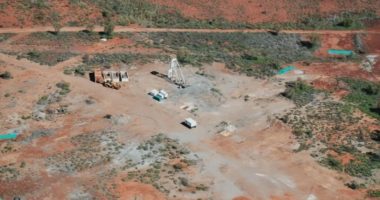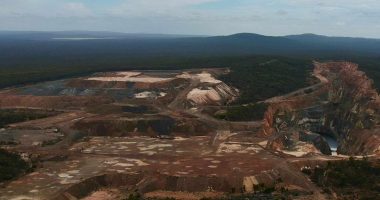Update: Red Mountain successfully consolidated its shares in Week 40 of 2024 (early October.)
Gold prices at record highs.
Two gold projects sitting on greenstone belts in world famous mining regions.
Never-intimidated project developer Red Mountain Mining (ASX:RMX), within the space of a week, has just kicked off two exploration campaigns across its two largest assets – both of them chasing after the safe haven yellow metal.
The company is, for all intents and purposes, under new management.
Recently appointed Managing Director Lincoln Liu has had his eyes on the helm of Red Mountain for a while.
“I have followed Red Mountain Mining for about 3 years and have always believed the Company has great potential as an explorer,” Liu told The Market Online.
“When the opportunity came up, I was enthused about the prospect of working with our team to unlock value from the existing portfolio.”
The first thing HotCopper users and other market-watchers may notice is the volume of shares on issue. But Liu stated the company isn’t too far away from a position where it can consolidate.
“We do have plans to consolidate, we believe that the time is right to consolidate our shares to improve share trading liquidity, coupled with the upcoming newsflow from our Canadian and Western Australian gold exploration projects,” Liu elaborated.
In a world like ours is today, there’s no shortage of reasons to believe gold prices will continue to be uplifted by ongoing purchases – from the old lady next door, to central banks and investment firms.
But before we dive into Red Mountain’s management and the overhead market trends that sit poised to benefit the company – and potentially create some serious shareholder value – let’s look at the underlying geology that makes this company’s recently acquired gold projects interesting.
I know, I know – we’re going to be talking about rocks, and not the more exciting gold price.
But there’s a method to the madness here. So why do greenstone belts matter?
Greenstone belts: a run-down
For the uninitiated: greenstone belts are well renowned by miners and veteran explorer watchers, given their typical geological formation across time is a friendly space for the slow-burning accumulation of mineral systems (read: “deposits.”)
All greenstone belts on earth come from the Archean era, a time before tectonic plates had formed on earth – meaning they’re ancient, which without the jargon, ultimately means there’s been more time for those structures to have slowly accumulated diverse mineral deposits crucial for our society.
In other words: a greenstone belt is the kind of thing that gets explorers excited.
Gold was first discovered in South Africa in the Barberton greenstone belt; but you may be surprised to learn that one of the most well-know gold mining regions in the world is also riddled with greenstone belt geology – WA’s Pilbara Craton.
Project #1: Fry Lake
The first is in Ontario, Canada, called Fry Lake.
The project acreage lies within the Meen-Dempster Greenstone Belt; Geology Ontario has previously looked around Fry Lake specifically and reported a litany of volcanic and sedimentary rocks – noting that the western end of the area has excellent bedrock exposure.
Not only that, but Red Mountain’s acreage at Fry Lake – it’s currently exploring a smaller target area of interest called Flicka Lake – is also nearby the Fry-McVean massive shear.
(A shear, or ‘shear zone,’ is similar to greenstone belts in that they tend to offer the right conditions for minerals to accumulate over time, leading to mineral deposits.)
“These shears and associated faults appear to be the mineralisation conduits for the area, controlling the alteration and gold distribution,” Liu told The Market Online.
“Finding and understanding where these structures lie is key to unlocking the mineral potential of the area. We also have ground magnetic and EM data which is assisting us in targeting the key areas.”
At least one group of prospectors in Ontario have found pockets of gold, iron, and molybdenum close together in mineral systems located within the shear.
Similarly, Geology Ontario has also detected trace elements of gold in the Fry-McVean shear in still fairly limited academic-style assessments.
Project #2: Kiabye Gold Project
Red Mountain’s second gold project is the Kiabye Gold Project in Western Australia’s Murchison region.
Like Fry Lake, Kiabye is located right on a greenstone belt asset. In fact, it’s named after one – the Kiabye greenstone belt.
This geological asset is a bit more obscure than the Meen-Dempster Greenstone Belt underlying Fry Lake of which there has been far more study done. But a 2017 document stored by the WA Department of Energy, Mines, Industry Regulation and Safety (DEMIRS) does contain some information.
The Kiabye greenstone belt is a small area within the larger Yilgarn Craton, which has contributed the underlying geology to a number of successful gold mines.
You may hear about the Yilgarn a lot – one thing to note is its size, which is important for context. It underpins most of southwest WA; the entire thing is Archean in age – showing that its ancient history has allowed it to accumulate mineral deposits all across the southwest.
What’s happening at Fry Lake?
Red Mountain’s flagship Fry Lake project, given its size, needs to be taken step-by-step: which is why the company has targeted one area of interest called Flicka Lake.
Located right near the Fry-McVean massive shear as described, the company’s geotechs are confident they can pull data eventually leading to near-term drill targets from this sampling run.
A number of high priority zones within the Flicka envelope have been selected for sampling with assays due back in October.
Rock chips and soil samples are the name of the game – the company is dependent on terrain with regards to the number of samples collected.
A local Canadian laboratory has been selected for assaying, ensuring timely returns.
What’s happening at Kiabye?
Eager to double their chances at finding a commercial-scale gold system, Red Mountain’s simultaneously got boots on the ground a world away in Kiabye preparing for the first drill run.
The company is collecting rock chips and soil samples across the considerable acreage with a view towards shoring up confidence in data surrounding old historical gold sites.
“We are really pleased to be mobilising [in late September] to commence sampling, targeting the anomalous gold bearing rocks at Kiabye South,” Red Mountain chief Lincoln Liu told The Market Online.
“The Kiabye Project, South east of Mt Magnet, covers a strike length of 23km2 of the greenstone belt with less than half covered by exploration samples from historical explorers. We believe this project is highly prospective for gold.”
The company is also collecting further evidence it will use in these early days to dismiss or retain interest in a number of existing electromagnetic geophysical targets at the project known to the company’s geotechs.
Sampling campaigns can be a bit boring compared to drill results, but the size of Red Mountain’s campaign shouldn’t be ignored – it’s collecting no less than 658 soil samples.
That the company will come up with a drill target is pretty much guaranteed; the company expects assay results by early October.
So what comes next?
Helmed by new manager Lincoln Liu, Red Mountain is a company starting fresh.
Sure, it’s got its challenges ahead of it – a competitive gold exploration sector; a local bourse that is still to draw back retail traders shaken out of the tree over the last few years; and an eventual need to consolidate shares given the number on issue.
Liu’s long-term goal for Red Mountain is with a view towards a merger and (or) acquisition, as opposed to creating a gold mine outright.
Red Mountain chief Liu recently invested his own cash into the latest placement after having his eye on the company for no less than 3 years. Liu’s background is in finance, but given the areas they’re working in, the company is well placed to tap local knowledge. Both Canada and Australia are gold mining hotspots, after all.
Liu has his eye on the return of the broader market to risk assets, given that he believes money isn’t flowing down to smallcap gold miners yet.
At the end of the day: Red Mountain is gearing up to kick off drilling in two gold mining hotspots to deliver shareholder value ahead of an eventual buyout once either project is shored up.
And don’t forget the gold price.
Disclaimer: The Market Online has a commercial relationship with Red Mountain.







